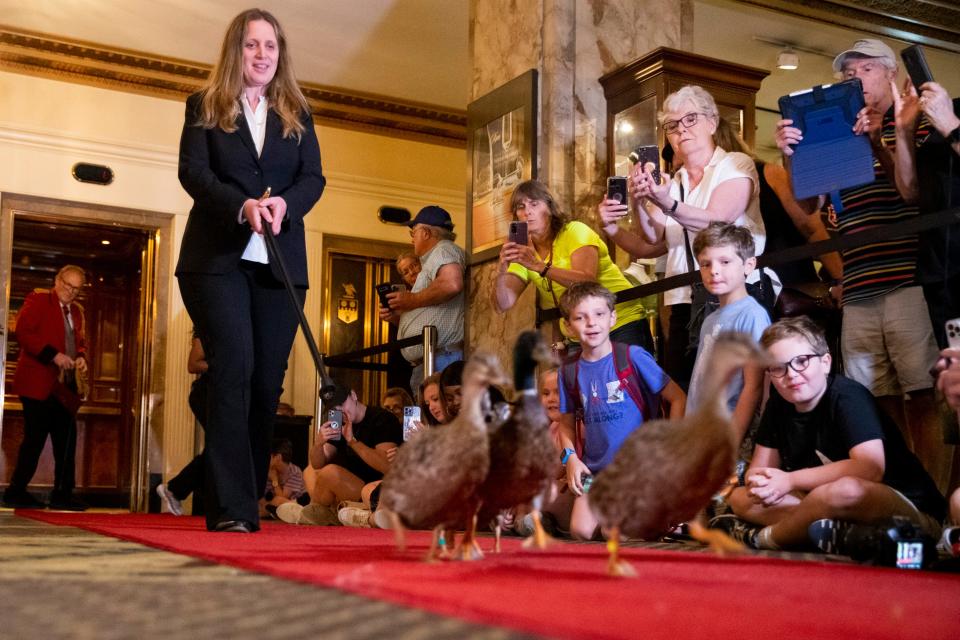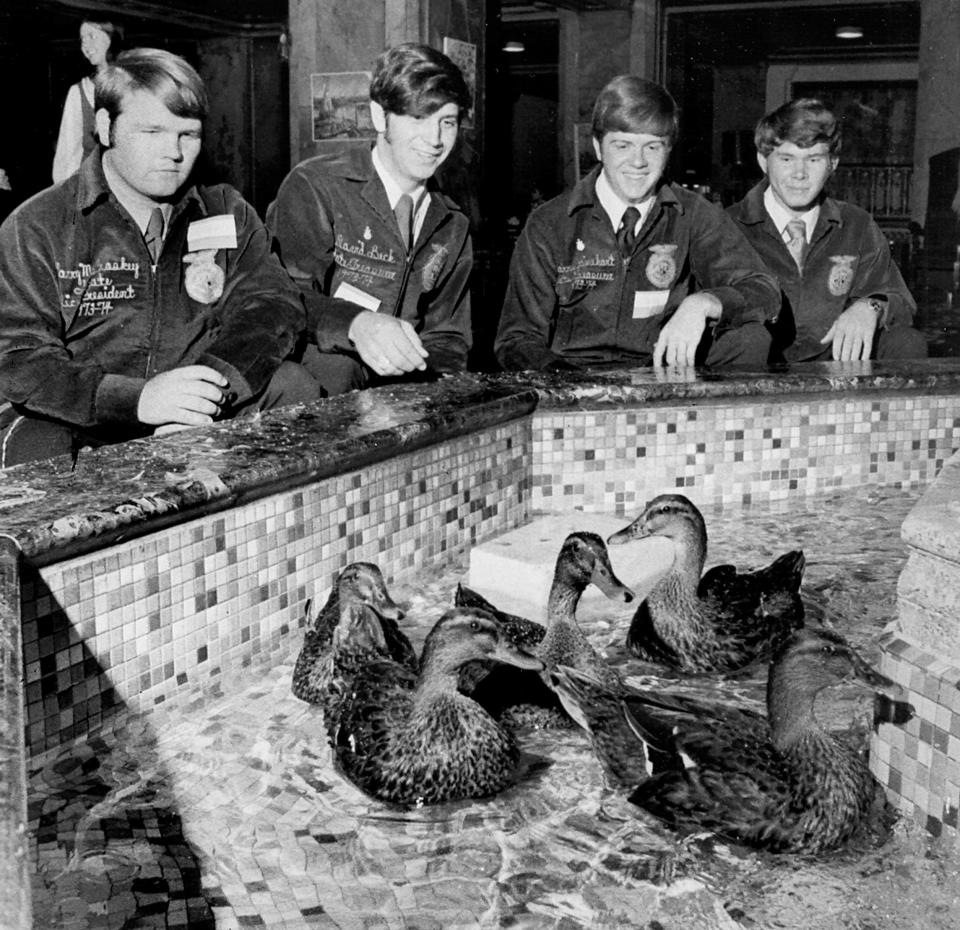Why does The Peabody have ducks? The story behind these quacky celebrities | Know Your 901
What do you want to know about Memphis?
Know Your 901 is a new initiative launched by the know-it-alls at The Commercial Appeal that seeks to answer your questions about the Bluff City and the Greater Memphis region.
Readers, we want your queries and your input! All subject matter is welcome: Culture, art, history, geography, celebrity, TV, music, food, and et cetera. Send questions to [email protected] and we will try to give you an answer in a future column.
Today's column answers a question asked by probably a thousand tourists (and maybe even some residents) each week...
Why does The Peabody hotel have ducks?
Or, as Chico Marx said to Groucho in "The Cocoanuts" (1929): "Why a duck?"
The routine, rife with typically convoluted Marxian wordplay, is motivated by Chico's confusion over Groucho's use of the word "viaduct." "Why a duck?" asks Chico, who employed broken English as part of his comic persona. "Why-a no chicken?"
Unfortunately, this comedic byplay is not really germane to the question at hand, which is (to more or less repeat ourselves): Why are those ducks in the fountain of the lobby of The Peabody?
Why do the North American mallards who are Memphis' most photographed runway models waddle each day at 11 a.m. down a red carpet that stretches from the hotel elevator to the lobby's marble fountain, where they remain in quacky celebrity residence until reversing the process at 5 p.m.?
DOWNTOWN MEMPHIS: Leave your lizards at home: Here's why reptiles are banned on Beale Street | Know Your 901
Why do they spend their evenings in a 288-square-foot rooftop "duck palace," where they nosh on poultry pellets, romaine lettuce and cracked corn.? Why are their peregrinations overseen by a human "duckmaster" who is The Peabody's most celebrated if not highest-paid staffer?
Why a duck?

According to the oft-told story found on various Peabody web (pun intended) sites and in back issues of the Memphis newspapers, the duck tradition "started by accident in the 1930s when the hotel’s manager came back from a hunting trip after drinking too much Tennessee Sippin’ whiskey," in the words of an Audubon magazine version of the yarn.
The man was Frank Schutt, general manager of The Peabody. Accompanied by a friend, E.C. "Chip" Barwick, the men released their live duck decoys in the fountain of The Peabody (at the time, hunters could use live decoys in addition to wooden or manufactured decoys).
Schutt, according to Audubon, "woke up the next morning fearing that all hell had broken loose and ran to the lobby expecting the worse. Instead, he found the ducks chilling calmly in the fountain — and the hotel guests enamored with the new arrivals. Seeing an obvious way to attract visitors, he made them a permanent fixture at the hotel."
The definitive account of this seeming tall tale was reported in 1981 by the Memphis Press-Scimitar's Charles Thornton (who four years later was shot and killed, at age 50, while covering Soviet-occupied Afghanistan for his post-Memphis newspaper, the Arizona Republic).
"A tradition was born on the day these two merrymakers went quackers," stated the caption under the photographic portraits of Schutt and Barwick that accompanied the story.

According to Barwick, he and Schutt arrived at The Peabody after a duck-hunting trip to Hazen, Arkansas, in 1932, "or thereabouts."
Said Barwick: "It seemed like a good stunt to put the ducks in the fountain and see what would happen." (Contrary to most versions of the story, "We weren't drunk," Barwick said, although he admitted "we had a few nips over in the blind.")
The ducks were a hit, even though they "weren't even mallards," Thornton wrote. "They were a breed known to sportsmen of the day as English callers — Judas ducks that called to passing flights of mallards in the Arkansas wetlands and enticed them into shotgun range."
DUCK DIPLOMACY: British consul general visits Memphis to boost Bluff City's ties to UK
But true to their name, the callers called out, a lot. They basically lived in the fountain, and their quacking was noisy, not cute. Hotel officials decided they needed a less foul fowl, and soon realized that mallards would fit the, um, bill.
Meanwhile, the "duckmaster" tradition was launched in 1940 by Edward Pembroke, a "former circus animal trainer" (per the Peabody website) who worked as a bellman at the hotel. He trained the ducks to make their soon-to-be-famous "Peabody Duck March" to the lobby fountain each day. Fifty years a duckmaster, Pembroke retired in 1991 and died three years later, at 84.
Like "Colonel" Tom Parker with Elvis, Pembroke accompanied The Peabody ducks as they wiggled their way from the local to the national stage. The duckmaster and his feathered friends marched for Johnny Carson on "The Tonight Show" and appeared at public events around the country. According to Pembroke's obituary in The Commercial Appeal, Pembroke "liked to eat ducks, but he had never eaten a Peabody duck, even one that had died in an accident, because that wouldn't be right."
The Peabody ducks FAQ
Does The Peabody hotel in Memphis still have ducks?
Sure does!
What time do the ducks walk at The Peabody hotel?
They talk their stroll at 11 a.m. and then leave the hotel lobby's water fountain at 5 p.m.
How much does it cost to see The Peabody ducks?
Absolutely free.
This article originally appeared on Memphis Commercial Appeal: Does the Peabody hotel in Memphis still have ducks?
